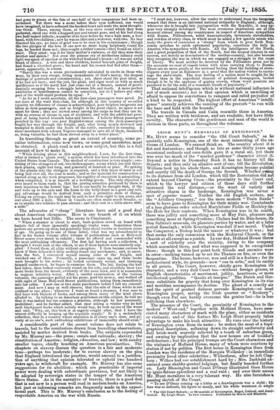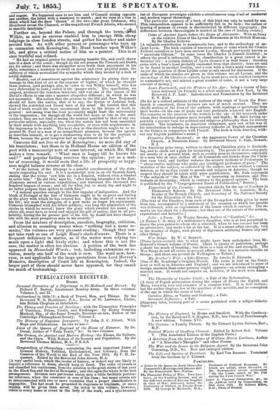LEIGH HUNT'S MEMORIALS OF KENSINGTON. * Mn. HUNT seems to consider
"the Old Court Suburb," as he quaintly calls Kensington, one of the most interesting of the en- virons of London. We cannot think so. The country about it is flat and featureless ; and though as late as some thirty years ago occasional orchards and corn-fields gave it a rural air, yet there was ever too much of the "market gardener" character about it. Beyond a notice in Doomsday Book it has no history till the Stuarts ; and then only an allusive sort of one, till the Revolution. William took up his abode there, and Kensington became palatial and courtly till the death of George the Second. Whether oming to its distance from old London, which till the Restoration did not extend beyond Charing Cross—the proximity to the Court end, which to the lawyer and citizen, of those days still further increased the real distance,—or the want of variety and attractive charm in the landscape, Kensington was never a spot of popular resort. Neither the old English archers, nor the "Artillery Company," nor the more modern "Train Bands" seem to have gone to Kensingtonlor their miene war. Combatants of a less glorious order selected Marylebone Fields or Hockley-in- the-Hole for their contests. When Kensington was in its zenith, there was jollity and something more at May Fair, pleasure and something more at Spring Gardens ; Chelsea had its Bun-house, its Don Saltero's museum, its pleasure-parties by water, and at a later period Ranelagh; while Kensington was dull if not moral. Under the Conqueror, a Bishop held the manor or whatever it was ; but that seems the only connexion with the Mediceval Church, or the Church at all except as a parish. In our day, Holland House threw a sort of celebrity over the vicinity, owing to the company which assembled there, and what was supposed to be excogitated there ; though in this last point both friends and enemies were in error—nothing turned up to set the Thames on fire or even the Serpentine. The house, however, was and still is a feature; for its architectural style, its grounds—now "rue in urbe," and its rarity in all points. The Court, however, chiefly gave Kensington its character, and a very dull Court too—without foreign graces; or English characteristics of merriment, jollity, heartiness, or more intellectual qualities. " Qualls ab inoepto." The Dutch and Ger- man substitute for gravity that hung over Kensington in its rise and meridian accompanies its decline. The ghost of a courtly air and the spirit of genteel dulness pervade Kensington—at least Kensington proper, saving the Irish quarter or " Rookery "; though even Pat can hardly overcome the genius loci—he is less
rollicking than elsewhere. The presence of the Court, the proximity of Kensington to the modern "West-end," together with Holland House, have asso- ciated many characters of mark with the place, either as residents or visitants; and of this feature Mr. Leigh Hunt properly takes advantage to make his book attractive. He runs over the history of Kensington even from its name ; he makes the most of a topo- graphical description, softening down its straight uniformity and dull brick-work scarcely relieved by a touch of suburban green, and owning by implication that the new houses are of builderPa architecture ; but his principal trumps are the Court characters and the visitants of Holland House, many of whom were courtiers by station if not by politics. The first house in Kensington Gore from London was the residence of the Marquis Wellesley : in immediate proximity lived other celebrities ; Wilberforce, after he left Clap- ham ; Wilkes had one establishment hard by ; Mrs. Inchbalclex- amined some shabby-genteel lodgings, but finally boarded further on. Lady Blessington and Count D'Orsay illustrated Gore House by ignis-fatnus splendour and a real ruin ; and over their career Mr. Hunt moralizes in a very tolerant way. He also furnishes it passing sketch of the Count.
"To see D'Orsay coming up a lobby or a drawingroom was a sight ; his face was so delicate, his figure so manly, and his white waistcoat so aniple • The Old Court Suburb; or Memorials of Kensington, Regal, Critical, and Anec- dotical. By Leigh Hunt. In two volumes. Published by Hurst and Blackett.
and august. We happened once to see him and O'Connell sitting opposite one another, the latter with a waistcoat to match ; and we were at a toes to think which had the finer 'thorax' of the two—the great Irishman, who thundered across the Channel, or the magnificent French Adonis, who seemed, to ennoble dandyism." r
Further on, beyond the Palace, and through the town,==lifad Wilkie, as soon as success enabled him to emerge felt cheap lodgings in close London streets, and gather his mother and sister around him. As with other persons or personages who turn up in connexion with Kensington, Mr. Hunt touches upon Wilkie's life, and gives a critical notice of him as a painter. This is at once truthful and refined.
"He had an original genius for depicturing humble life, and could throw into it a dash of the comic ; though he did not possess the Flemish and Dutelt, eye for colour ; and there was altogether more truth than enjoyment in his style, sometimes a tendency to dwell on moral and even physical pains, the sufferers of which neutralized the sympathy which they needed by a look of
his translators; but there is in Holland House an edition of the N. I.
makes a true remark. "What man is happy till he knows his end?" and popular feeling receives the opinion; yet as a mat- ter of reasoning, it would seem that a life of prosperity or happi- ness might balance reverse at the close.
ease, the matter is often too obvious. A portion of the book has itennett's former volume cd Poems. Them is plenty of patriotism parings appeared in Household Words ; but, including extensions on re- a shade too much of boasting ; but there is a lack of fire and strength. T e 11.91011, nearly one half of the work is new. The word new, how- War Songs do not all relate to present affairs. One is a sarcastic diatribe OR
ever, is not applicable to the large quotations from Lord Hervey's Memoirs, descriptive of Court life at Kensington. Indeed, the larger part of them should never have appeared, for they smack too much of bookmaking.
" At the bottom of the titlepage is a painful corroboration of the state- .as the glory with which he has covered her. But the death of a man is not for the Education of the Poor.
lots with the most prosperous man in his country." ,Julia: a Poem. By Wesley Brooke, Author of "Eastford," &e. From the mixture of description, anecdote, biography, criticism, [A Boston U. S. story of a millionaire's daughter, who is at last permitted to and allusion to sounding names when "nothing but a name re- marry the poor genius to whom she is attached, when he has rescued her from mains," the volumes are very pleasant reading; though they can- an adventurer, and made a bit at the bar. It is a smart affair enough, told ma not take rank as one of Leigh Hunt's chefs-d'oeuvre. There is a other things.] frequent deficiency in matter, as if the writer were relying too War Songs. By W. C. Bennett. much upon a light Mid lively style; and where this is not the [These lyrics scarcely rise to what might have been anticipated from Mr.



























 Previous page
Previous page